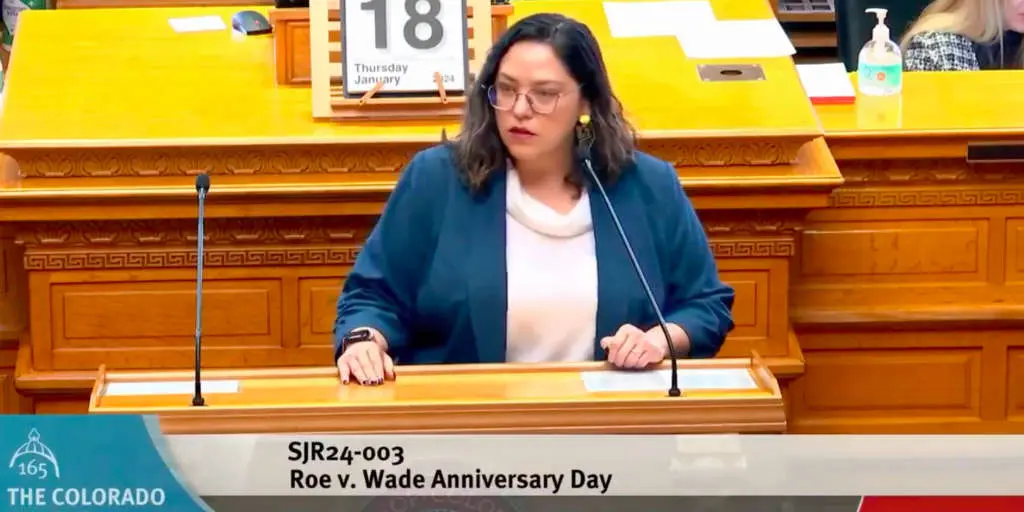Colorado legislators are moving to strengthen Colorado’s shield law, which protects abortion patients and providers from prosecution by states where abortion is illegal. In December, Texas Attorney General Ken Paxton sued Dr. Margaret Daley Carpenter of New York for providing medication abortion to Texas residents in violation of state law. Last week, a Louisiana grand jury indicted Carpenter on similar charges. These cases could challenge the shield laws in place in states where abortion is legal.
“In this case, an out-of-state doctor violated the law and caused serious harm to this patient,” said Paxton in a news release. “This doctor prescribed abortion-inducing drugs — unauthorized, over telemedicine — causing her patient to end up in the hospital with serious complications. In Texas, we treasure the health and lives of mothers and babies, and this is why out-of-state doctors may not illegally and dangerously prescribe abortion-inducing drugs to Texas residents.”
This morning, members of Colorado’s Democratic Caucus and representatives from abortion advocacy groups like the Colorado Organization for Latina Opportunity and Reproductive Rights (COLOR) and Cobalt held a press conference to discuss upcoming legislation.
“We’ve already seen Texas and Louisiana bring legal attacks on health care providers in New York, and across the country, pregnant people are dying because of barriers to access the care they need,” said Vanessa Martinez, the policy director at COLOR. “We can’t afford to be complacent. We must be bold and resolute and work towards strategies to ensure Coloradans receive the care we need and the care we clearly demanded when we voted to make abortion a right in our state constitution.”
Sen. Lisa Cutter (D-Dakota Ridge) discussed the bill she plans to introduce this week. “This week, I am going to be introducing…a bill to strengthen and protect the shield law that we passed in 2023 with my colleague, Sen. [Faith] Winter (D-Westminster). Regrettably, we’re now having to strengthen these protections in the face of these growing attacks from hostile states to reproductive justice. This bill will support providers in practicing with dignity and protects patients from being targeted for exercising their right to make decisions about their own bodies and futures.”
Cutter’s bill will allow a medical provider’s name name to be excluded from a medication abortion label, require subpoena requests to affirm there is not a request for protected information, and prohibit compliance with hostile out-of-state actors.
“We’ll really need to expect to update our shield bill every year,” said Martinez. “That’s just the reality that we live in now. We’re seeing attacks on reproductive healthcare and increased barriers [to care] continue. We’ll need to continue to be vigilant and strengthen protections. This bill has been reviewed by the attorney general’s office, by national lawyers, and we are doing everything that we’re able to in Colorado to protect patients and providers here.”
At the federal level, U.S. Rep. Eric Burlison (R-MO) has introduced legislation “to implement equal protection under the 14th article of amendment to the Constitution for the right to life of each born and preborn human person.” Cosponsoring this federal personhood legislation is Rep. Jeff Crank (R-CO).

“I invite Congressman Crank to look at the November, 2024 election results regarding Amendment 79, and the multiple ballot measures that sought to establish fetal personhood,” said Sen. Julie Gonzales (D-Denver). “That’s part of why we’re doing this work here today because the federal environment is so filled with whiplash where one moment they’re saying, ‘Leave this to the states,’ and then the next moment, we do, and we codify abortion protections in our constitution, and next thing they want to run a bill [to limit abortion at the federal level].”
In 2008 Colorado saw the nation’s first attempt at a “fetal personhood” ballot initiative with Amendment 48. Kristi Burton Brown, the former Colorado GOP Chair who was recently elected to the Colorado Board of Education, was the sponsor behind that measure, and has built her political career on her anti-abortion stance. Amendment 48, and a 2010 attempt, Amendment 62, were both rejected by voters with over 70% of voters opposed, and did not receive a majority vote in any county in Colorado. Amendment 67, in 2014, was rejected by nearly 65% of voters, and 2020’s Proposition 115, which would have banned abortions after 22 weeks of pregnancy, was defeated with 59% of the vote, after opponents spent $9.5 million to campaign against the measure. In 2022, an attempt to classify abortion as “murder” failed to gather enough signatures to even make it on the ballot.
Since the Supreme Court’s Dobbs decision, which overturned Roe v. Wade, Colorado has seen an influx of out-of-state patients, primarily from Texas, seeking abortion care. “We anticipate spending even more this year to support as many people who need access to abortion care as we are able,” said Karen Middleton, president of Cobalt, in an email. “The shield law update will help our patients, providers and assisters who we work with every day. We do not intend to slow down or limit our work.”




